![]()
Emotions are running high these days – about everything.
But since radio is my “beat,” I’m even more attuned to the many things written and said about the medium – good and bad – especially at a time when businesses, industries, and institutions are being profoundly tested.
Many people, inside and outside of broadcasting, still very much love radio – or at least the radio they remember growing up with. Then there are the self-haters – those who have been burned or even betrayed by the industry, but still carry a radio torch. I especially feel for that growing group of disenchanted radio lovers who still revere radio, but find themselves without a gig.
But what about those who have always been on the periphery – radio fans who have been in and around the medium, but aren’t really a day to day part of the business as we know it?
What drives them? Why are they so passionate about radio, even though they’re on the outside looking in?
I don’t care whether you’re Sean Ross or Art Vuolo who seemingly know every little nook and cranny about the medium. Today’s post is about three radio stations and their owners, none of which you’ve probably ever heard of. But they are making an impact.
Andrew Patterson’s WOTW, Deke Duncan’s 77 Radio, and Dylan Carollo’s D100
Sound familiar? Probably not. But there are great stories behind all three of these stations, as well as the masterminds behind them. Each is unabashedly in love with radio and everything it has ever represented. They simply show their passion in different ways than the rest of us.
At a time when we could all use a little hope, I found them inspirational, and I hope you will, too.
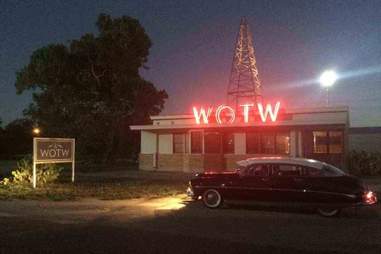 “The Vast of Night” is a new movie on Amazon Prime. It’s a first-time effort by 38 year-old director, Andrew Patterson, . The film is set in the 1950’s and features WOTW‘s night time DJ, local high school student Everett Sloan.
“The Vast of Night” is a new movie on Amazon Prime. It’s a first-time effort by 38 year-old director, Andrew Patterson, . The film is set in the 1950’s and features WOTW‘s night time DJ, local high school student Everett Sloan.
The film pays tribute to other iconic shows and movies: “Twilight Zone,” “Close Encounters of the Third Kind,” and Orson Welles’ “War of the Worlds” (remember those call letters).
There’s a lot great sci-fi drama in this movie, but it is also a film about the power of storytelling – and not just Patterson’s script, but the hypnotic effect a great story on the radio can have on its audience.
This film is charming, and for radio old-timers, the sight of a 1950’s radio studio with open-reel machines, turntables, and other accouterments of days gone by has a nostalgic power.
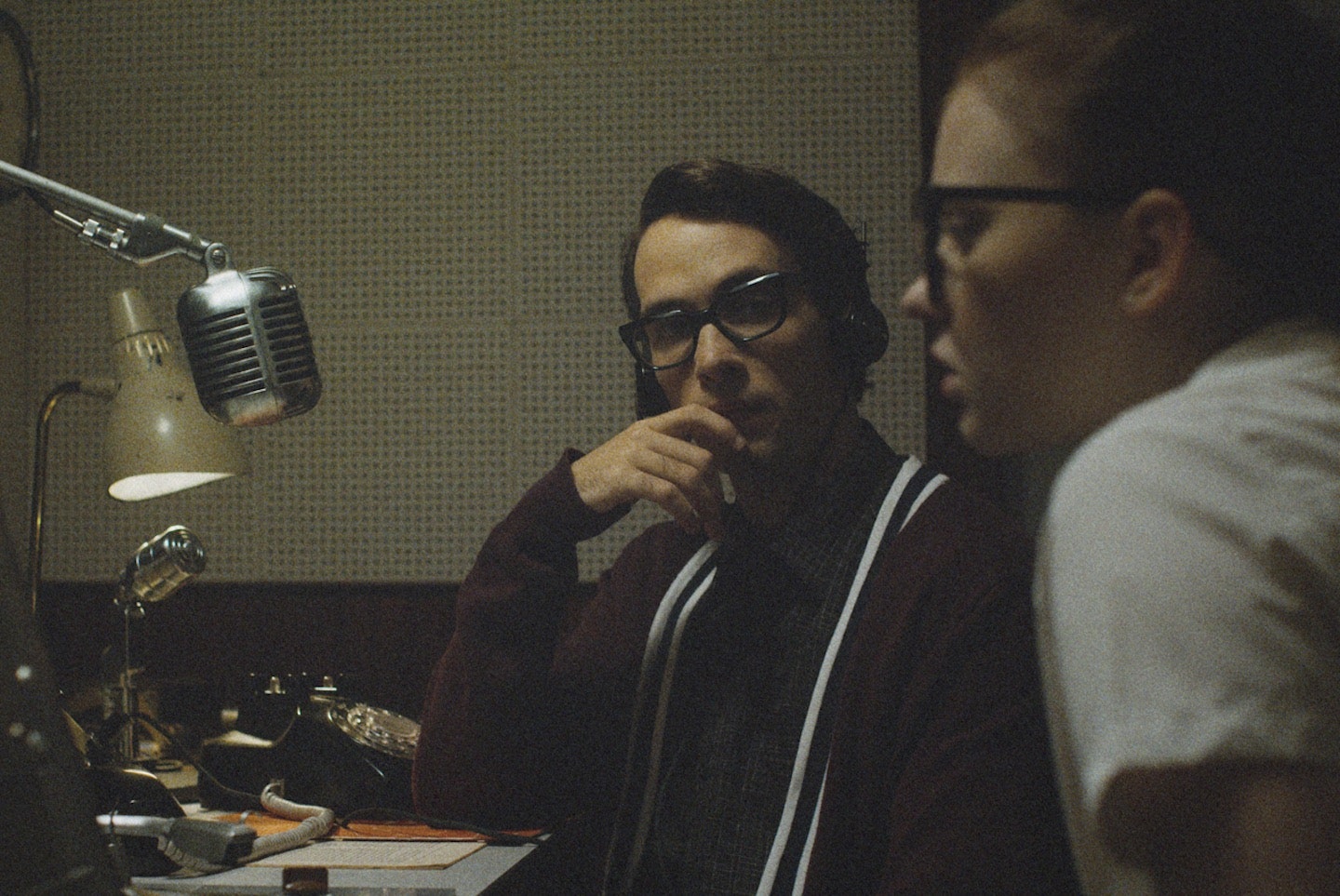
But so will WOTW’s paramount role in its fictional community of Cayuga, New Mexico, and the dedication of DJ Everett to his station, his craft, and his audience.
It is powerfully exciting to see a through and through young radio guy (along with his friend, Fay Crocker) unravel the mystery. The centerpiece of the story – WOTW – beams throughout the film.
For Patterson, “The Vast of Night’s” road to success has been precarious. The film was actually made in 2017, but was rejected by festival after festival. That was until Slamdance in Park City, Utah, picked it up last year. Now, we can all stream it on Amazon Prime from the comfort of our media rooms.
Andrew Patterson was interviewed earlier this year by KPCC/Los Angeles’ host, John Horn, and provides context for “The Vast of Night” – and its connection to radio:
“I love storytelling…I think you can sit in a theater and listen to people tell great stories, I think you can do it on radio, I think you can do it in books, graphic novels, and podcasts in every format.”
Those of you who actually started out in radio, in high school working for your hometown radio station, will see yourselves in Everett and Fay. And they will remind you of your passion for radio.
 D100 – Speaking of high school, our next story about an Internet radio station founded in 2014 is a fascinating one. D100 was signed on by then 11 year-old Dylan Carollo.
D100 – Speaking of high school, our next story about an Internet radio station founded in 2014 is a fascinating one. D100 was signed on by then 11 year-old Dylan Carollo.
But this kid is not dying to work in broadcast radio. In fact, he refers to it as “a trend of the past.”
D100 has a solid website, it’s available on iHeartRadio and while Dylan broadcasts from his home studio in Winter Park, FL (a suburb of Orlando), the station is headquartered at One World Trade Center in NYC.
For Dylan, the radio bug hit earlier than most: the 6th grade. But with one important caveat: he envisioned the confluence off broadcasting with the Internet: “I guess I have always seen the possible fusion of radio, Internet and mobile devices and have believed that radio and the media industry could have a measurable and lasting impact on our society in times of need and stress. To me, music represents the universal voice of our planet. I wanted, in some small way, to have that same positive impact.”
While for most people growing up, key influences may have been famous DJs, like Larry Lujack, Howard Stern, or Scott Muni. For Dylan, it’s been tech and media icons like Disney’s Robert Iger and Apple’s Tim Cook.
Since the pandemic, Dylan has turned his energies and D100 into a fundraising machine for frontline workers, collecting more than $30,000. And in 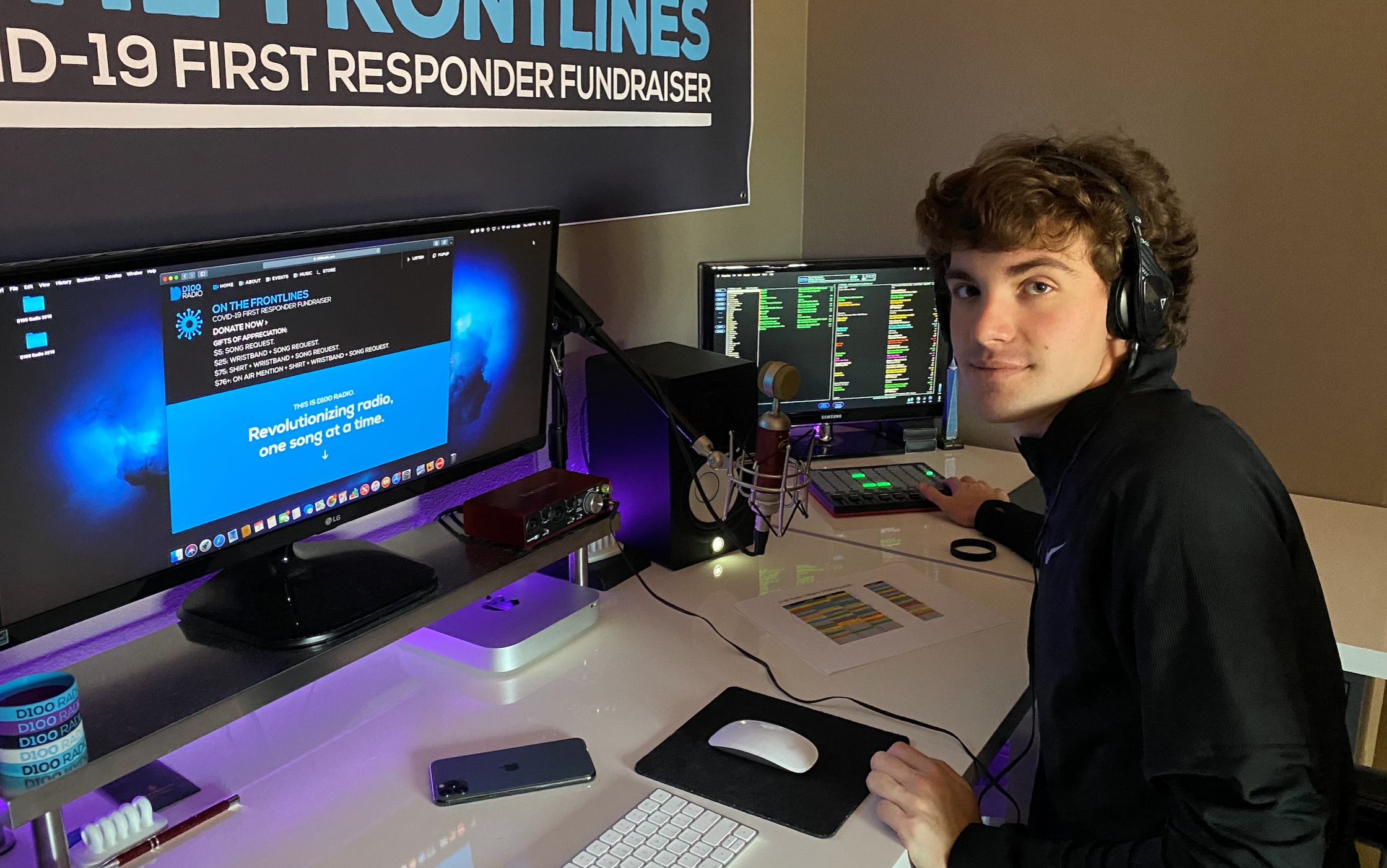 the process, he has discovered radio’s great capacity to give back. The result was “an interactive fundraiser, where a listener could submit a song request, and in turn depending on their level of donation, would receive a prize as a gift of appreciation.”
the process, he has discovered radio’s great capacity to give back. The result was “an interactive fundraiser, where a listener could submit a song request, and in turn depending on their level of donation, would receive a prize as a gift of appreciation.”
Because D100 is national (OK, global) in scope, he also discovered the project had logistical challenges – including finding deserving organizations in each community (especially “hot spots”), and getting them on-board. But who would take an 18 year-old seriously?
Dylan told me “it wasn’t until after the fundraiser was over that most of them realized the station is actually run by a teenager.”
The other problem was expenses – especially the costs of shipping the incentive prizes to the many financial contributors who took part. He convinced UPS to donate both shipping and delivery. Problem solved.
“I have learned the significant impact and influence media can have and the growing power of social media,” says Dylan. “I have also learned the power of individual communications and the importance of building trust and confidence, along with delivering on your promises.”
 D100 has also made an impact with its music programming, and its ability to jump on trends. When you’re a teenager programming to other teenagers, it’s not a heavy lift to know what working:
D100 has also made an impact with its music programming, and its ability to jump on trends. When you’re a teenager programming to other teenagers, it’s not a heavy lift to know what working:
“We were one of the first stations in the country to recognize and play BTS (the world-renowned South Korean K-Pop band) in 2017. And we saw the ability to reach a global audience.”
He is clearly living up to D100’s slogan: “Revolutionizing radio one song at a time.”
Why do I get the feeling that before too long, many of us will be working for this kid?
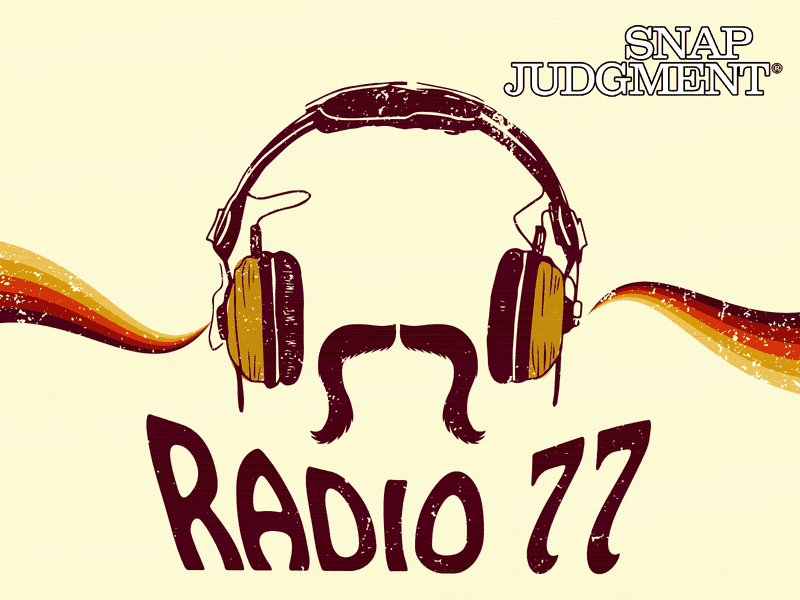 Radio 77 – And now, we visit the other end of the spectrum. The final story in this radio trilogy is about a station that never really broadcast in the traditional sense, and was based in the garden shed of DJ wannabe Deke Duncan who lived in the UK in the 1960’s.
Radio 77 – And now, we visit the other end of the spectrum. The final story in this radio trilogy is about a station that never really broadcast in the traditional sense, and was based in the garden shed of DJ wannabe Deke Duncan who lived in the UK in the 1960’s.
Actually, the station was “signed on” if we can use the term when Deke was still in his twenties – not much older than Dylan Carollo is now.
Radio 77’s cume audience was whoever was sitting in his house – the only place where the station could be heard. Yes, we’re talking about a “cume” of 1 – but with incredible time-spent listening.
That’s because the “main studio” was located in Deke’s garden shed. He built in in the 60’s with the express goal of teaching himself the art of being a music radio presenter, and eventually getting on the air on a radio station in the UK or the US.
Inspired by pirate station “Radio Carolina,” Deke ran into every obstacle to getting on the air. And Radio 77 was born.
Deke taught himself the disciplines and style of being a boss radio DJ by painstakingly evaluating his own airchecks. To him, being on the radio was a noble craft. In fact, he has disdain for those who refer to on-air talent as personalities or hosts. To him, there’s no higher calling than to be described as a DJ.
How did he arrive at the name of his station? That was an easy call. Deke got hold of a jingle package from the iconic 77WABC, chopped off the call letters, and had 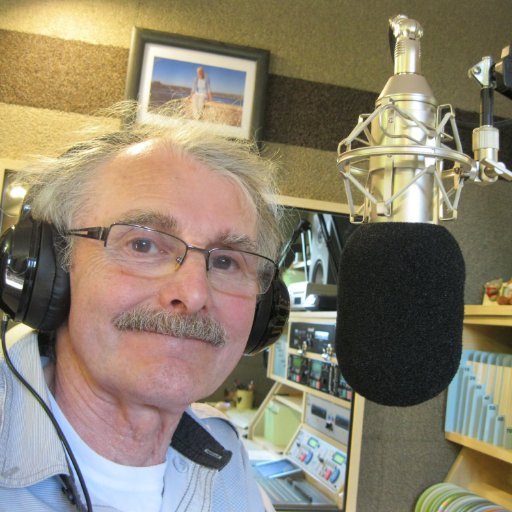 himself a brand name with a great signature sound.
himself a brand name with a great signature sound.
Deke Duncan’s story – told brilliantly on the public radio show “Snap Judgment” by producer John Maysh – is a tale of trial, error, rejection, failure, more rejection, and exceedingly bad luck.. His perseverance goes above and beyond even the most committed people I’ve met over the decades who longed for a career on the radio airwaves.
This episode tracks Deke Duncan’s episodic journey that included a radio station on a ship, a San Diego station, and eventually back in London at the venerable BBC for a Christmas special.
And his story is truly an amazing one.
So, three tales about amazing dedication and passion for radio among people who never technically worked in the broadcasting industry.
Deke Duncan is a 75 year-old devotee of radio who was so hungry to be on the air, he set up a station in his backyard. Meanwhile, 18 year-old Dylan Carollo is trying to modernize radio broadcasting with an online station that acts like the big boys – and then some – breaking songs and raising funds for great causes. And then there’s Andrew Patterson, a Gen X movie director who saw the power of radio as a way to frame his fascinating story that has launched his film career.
They also remind us about the power of a great story – an element that is paramount to radio success.
Nearly 100 years-old, the medium of radio continues to have impact.
You can hear KPCC host John Horn’s interview with Andrew Patterson here.
You can hear Dylan Carollo’s D100 on iHeartRadio here.
You can hear the “Snap Judgment” feature on Deke Duncan’s Radio 77 here. Skip to the three minute mark.
Special thanks to Dave Coombs.
- 5 Lessons For Radio From The Apple Watch - May 5, 2025
- DJs And Baristas: Can They Save Their Companies? - May 2, 2025
- Radio’s New Audience Equation: Z Over Y = Trouble - May 1, 2025




THE VAST OF NIGHT is a beautiful show and one of the few that accurately portrays a night jock. It’s terrific. This column was A LOT of work Fred and I salute you. Nice.
Thank you, Walter – a compliment indeed. I ate the film up. It so captured the spirit of radio.
Thanks for honoring the love, Fred. I know it’s possible for a person to work in radio as “just a job,” but to me that is unimaginable. Every minute I spent at a station or in the studio over the years was absolute magic to me, and even now that I’m retired it’s still a thrill tuning what we still call a “dial” and pulling in a signal, near or far. If we could only ignite and harness a thrill like that for larger matters (eg, living on earth), many of our problems would evaporate. Just a job–Not!
John, thanks for the comment. I was hoping that radio vets would see themselves in these stories.
Vast of Night.
Ok.
On my watch list!
Thanks for another informative and enlightening post, Fred!
-signed, a furloughed “dj”
Sorry to hear this, JC. The movie will make you smile.
Thanks Fred. I’m good!
Thanks for the recommendations Fred, and for digging up these stories! Reminds me of driving 40 miles from Lincoln, to York, NE on Fri and sun nights my senior year in college to do the final news segment and then sign off their AM daytimer at sunset, and babysit the automated FM until Midnight. Confession. I’d segue to the live turntable once in awhile, and throw on a disc of my own choosing. Ha. My only question is….did WOTW have a Gates board?
I’m trying to remember. It may have actually been an RCA board. There were also Magencorders. LMK what you see in the control room.
Thanks for this Fred….Radio IS magic!
All too often, we forget why we first fell in love with it, or the power it (still!) has to change lives and communities.
I fell into radio accidentally at 15, and 44-years later, I’m still amazed at the connection radio makes possible between personality-listener-community-business: seamless relationships.
Ok, I’m off to stream a movie…!
Bev, let us know how you enjoy it. Thanks for the comment.